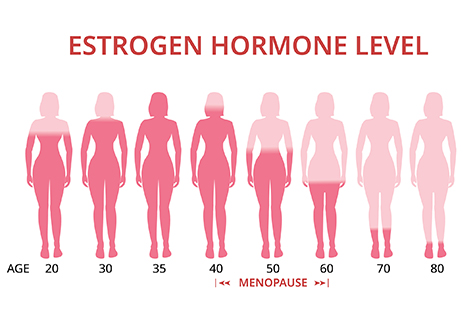Fasting, Estrogen and Women’s Health

“Estrogen is not just about reproductive health. It’s about life itself. And it’s about metabolism,” says Felice Gersh, M.D., who is the Medical Director of the Integrative Medical Group of Irvine Consultative Faculty. She was one of the expert speakers at the American Association of Anti-Aging Medicine’s (A4M) 26th World Congress, which was held in Las Vegas last December.
The FoodTrients team and I attended the three-day event, which was loaded with speakers, workshops and exhibits presenting clinical education and advances in the most recent research and practices as they relate to wellness and aging. Many of the sessions were geared toward medical professionals, but we were able to distill information to share with you in lay terms.
“Estrogen receptors influence gene expression and activate non-genomic pathways,” Dr. Gersh adds. She spoke to a crowded auditorium at the Venetian Hotels Conference Center on the subject of fasting and estrogen. For those of us who have experienced menopause and the effects of estrogen on aging, this is one topic that got my attention. Here’s is what we learned.
Men and women have different immune systems, but sex-based immunological differences have historically been overlooked. Luckily, research and awareness growing!
Our differences are driven by:
- X chromosomes
- Epigenetics
- Hormones
- Microbiome
- Circadian Rhythm
- Age and Reproductive status
Estrogen has a variety of diverse impacts in the body, and has critical roles in extra-gonadal tissues, including our heart, muscles, bone, joints, gut, liver, arteries, skin, immune cells/mitochondria, bladder, lungs, and brain.
There are estrogen receptors on every cell in your body, and estrogen also plays a protective role in our bodies delivering an impress list of benefits.
Estrogen:
- Increases lean body mass
- Reduces abdominal fat
- Improves insulin resistance
- Decreases LDL/HDL ratio
- Decreases blood pressure
- Improves endothelial health
- Maintains bone density
- Improves mood and sleep quality
- Reduces skin wrinkling/hair loss
- Maintains cognition
- Moderates appetite
- Maintains gut & gut microbiome
- Modulates inflammation
- Maintains the immune system
“Estrogen and fasting are a team. They can work together to help cells,” Dr. Gersh says.
How does fasting help women and estrogen production? It can:
- Reduce oxidative damage and inflammation
- Optimize energy metabolism
- Bolster cellular protection
- Protect against diabetes, cancers, heart disease, neurodegeneration
- Reduce obesity, hypertension, asthma, rheumatoid arthritis
As women age, our estrogen levels shift. Post-menopausal women are vulnerable to many conditions associated with aging like insulin resistance, obesity, diabetes, cancer, Alzheimer’s, sleep disturbances, inflammation and more.
Women’s bodies have adapted to varying conditions of food availability and scarcity. When food is scarce, nature will postpone reproductive functions until food returns, and reproductive life may be prolonged by periods of fasting.
Autophagy
Autophagy, which is essential for survival and health, is a biological process that plays a key role in your body’s ability to detoxify, repair, and regenerate itself. When you activate your body’s autophagy, you reduce inflammation and slow down the aging process. Unfortunately, autophagy declines with age, and this decline is prominent in heart disease and other chronic diseases.
Estrogen and fasting work together to improve survival and help autophagy, which plays and important role in regulation of aging & age-related degenerative diseases.
Circadian Rhythm
Like autophagy, circadian rhythm plays another critical role for our bodies. We are programmed by the rhythm of the earth’s turning – the circadian rhythm:
- Daylight allowed our ancestors to see, hunt, gather, prepare, and enjoy food.
- Darkness made all of this difficult.
- So we rested, and we fasted until dawn and sometimes longer.
Circadian disruptors can cause a loss of estrogen. Disruptors like:
- Nocturnal light exposure
- Poor or interrupted sleep
- Stress
- Traveling across time zones
- Working night shift
- Improper meal timing
Loss of estrogen alters our circadian rhythm and has a significant impact on our health, including:
- Altered mood and mood disturbances: higher prevalence of anxiety, depression,psychiatric disorders
- Impaired cognition
- Atherosclerosis
- Metabolic alterations
- Increased cancers
- Significant reduction in melatonin production
For women, menopause is inevitable, but what can we do to reduce its negative impact?
Meal Timing
Combined effects of both periodic fasting and time restricted eating can create a positive impact on circadian rhythms and our body clocks. You can correct the clock with meal timing. Here’s what Dr. Gersh recommends:
- Eat dinner early (by 7 p.m.)
- Eat at approximately the same times each day
- Limit snacking
- Eat larger meals (breakfast and dinner) about 13 hours apart
- Eat a large, healthy breakfast by 10 a.m.
- Incorporate the fasting mimicking diet or a periodic water fast
Nourish Your Microbiome
Dr. Gersh says the best diet to nourish your microbiome includes:
- Complex carbohydrates (70%) whole-grains, all varieties of vegetables, beans,legumes, etc.
- Healthy fats (omega’s 3, 6 and 9) from nuts, seeds, olives and coconut
- Natural fiber and prebiotic rich foods
- Probiotic rich foods
- Green leafy vegetables and root vegetables
- LIMIT protein (approximately 12%)
- AVOID
- Initially, protein from dairy and eggs
- Sugar and refined carbohydrates
- Alcohol
- Food intolerances
Hormonal Therapy
Dr. Gersh also suggests that hormonal therapy in menopause:
- Increases lean body mass
- Reduces abdominal fat
- Improves insulin resistance and reduces fasting glucose if diabetic
- Decreases LDL/HDL ratio
- Decreases blood pressure
- Improved sleep
- Benefits for cognition and mood have also been seen
“Periodic fasting is a great way to improve all the standard measures of metabolic wellness and is the best way to trigger important processes like cell rejuvenation (autophagy), killing off of bad cells (apoptosis), increasing brain growth factors, and even stimulating stem cells to proliferate,” says Dr. Gersh.
She chooses for herself and recommends to her patients the Fasting Mimicking Diet from the Longevity Institute at USC, which is now made into a commercial product called ProLon.


